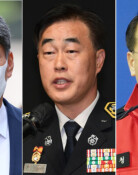[Editorial] Transparent and Fair Investigations and Trials Are the Goals
[Editorial] Transparent and Fair Investigations and Trials Are the Goals
Posted April. 29, 2005 23:39,
The prosecution is strongly resisting a code of criminal procedure reform plan currently under review by the Presidential Committee on Judicial Reform (PCJR).
Our belief is that enhancing transparency in investigations and trials should be the primary standard of judicial reform discussions, where protecting human rights of citizens should be their chief goal. The old practices of secret decisions and coercive enforcements should be avoided by all means, not only in the prosecutions investigations and support of public actions, but also in the process of trials in court. The court system should be transformed into an open and fair one where all defendants, advocates and audience members cannot help but acknowledge transparent and lawful procedures.
The reason why the prosecution has the whole nation against it is obvious. The prosecution has long been suspected of abusing its exclusive rights to accusations, failing to make transparent investigations. It has also been under criticism for forcing confessions on the basis of interrogations that are designed to extract confessions. Furthermore, it has been widely perceived that the investigatory powers themselves have become exceptions in their investigations.
There also are some loopholes in the argument that non-acknowledgement of interrogations of defendants written by the prosecution as evidence are depriving it of its investigatory powers. Such a measure cannot be called a debilitation of the prosecution, as such non-acknowledgement is confined to cases where defendants dismiss the interrogations in court. Those interrogations can be used when submitted to court as evidence in different ways. Moreover, considering that the PCJR even has some prosecutors as its members, the prosecutions late, radical response is somewhat unreasonable.
Given that transparency is the top priority, the Presidential Committee on Judicial Reform is also problematic. The code of criminal procedure is the framework of the criminal justice procedure that has been in existence since the establishment of Korea, where human rights of all the citizensconsumers of the judiciary serviceare at stake. In discussing a revision of the code, however, the committee is seemingly setting a date, even without holding a single public hearing, to push forward with their plan. It is also true that they made insufficient efforts to hear the voice of the public over restricting the function of the prosecution, an advocate of public interests, which clarifies the truth about crimes.
Cheong Wa Dae and the president have also made non-transparent interventions on this issue, raising doubts on sincerity of the PCJRs operations. The prosecutions resistance intensified when the PCJR plan was announced right after the president had pressured the prosecution, somewhat threateningly, to abandon its powers that exceed what is stipulated by the system. Though having nothing to do with the administrations interests, the reform plan has long been expected to face strong resistance from the prosecution. Furthermore, its transparency and persuasion have declined as the president, whose relations with the prosecution have been sour since his inauguration, takes the initiative in overhauling the prosecution.







